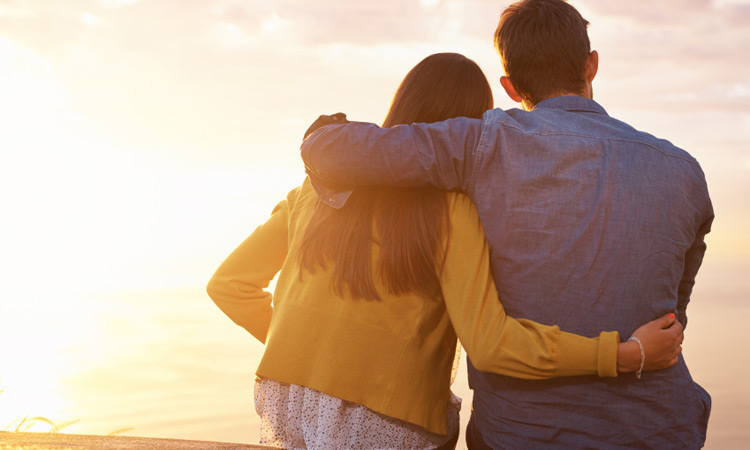Paula Holland De Long, 18-year breast cancer survivor, founder of What’s Next For My Life Inc., and professional life coach, knows how cancer can change self-perception and affects a relationship: “The [breast cancer] diagnosis shattered my already fragile self-confidence,” she explains. “I experienced this weird combination of shutting down and pretending I didn’t care, combined with a desperate need for reassurance that [my husband] still wanted me.”
For De Long, cancer put pressure on an already strained relationship. A feeling of obligation held the marriage together for two years before they divorced. De Long’s experience closely correlates to how cancer alters romantic relationships: While a study published in Cancer reports a 6-fold increase in partner abandonment when wives (versus husbands) receive a cancer diagnosis, research published in the Journal of the National Cancer Institute reports that breast cancer survivors who had poor marital relationships prior to diagnosis were the ones most likely to experience marital discord afterward.
One of the main relationship problems, De Long notes, is “…when couples are not in the fight with honesty and vulnerability on both sides. Both parties are terrified, anxious, uncertain, and stressed. Both are being strong for each other and both end up isolated and afraid. The experience also seems to amplify whatever may already be strained in the relationship. I withdrew more, so he withdrew. He wanted to help and I wanted to hang onto my self-sufficiency. I needed to be held; he wanted to fix it….It helps so much to be able to speak about the fear and angst together, and that can be really hard if you aren’t used to communicating that deeply.”
The couples’ guide to managing breast cancer
The emotional (and physical) effects of breast cancer can be significant. Cindy Collins, Health Psychologist and Nutritionist with South Florida Radiation Oncology, cites resulting sexual issues (that affect personal identity as well as the romantic relationship) plus fatigue, as factors that dramatically alter lifestyle.
Dealing with these changes, Collins says, requires willing participation from the patient and the caregiver. She and De Long both suggest that sustaining a functional, loving relationship gains strength from working as a team. A few areas to explore teamwork include:
Lifestyle changes: Collins suggests reducing meat and fat intake, learning to include nutritional supplements (e.g. anti-oxidant, anti-inflammatory, flax seed, and turmeric), and light exercise (jogging or tai chi).
Patience: Collins explains that breast cancer becomes a “chronic dual diagnosis,” one that necessitates patience in three important ways: 1) the survivor for the spouse, 2) the spouse for the survivor, and 3) each party with him or herself.
Alternative intimacy: Finding ways to still engage in intimate acts even when a body has been altered helps maintain the romantic connection. Communication is key. De Long advises, “Be kind and compassionate with each other. Admit your deepest fears. Don’t try to be strong. Ask for what you need.”
Self-care: Survivors and caregivers both need strong self-care strategies to preserve energy. Collins notes that a spouse can even inspire a survivor by practicing (and modeling) self-care in ways that allow the survivor to see strength and options for proactive well-being.
Cultivate togetherness: Collins suggests, “Really focus on what you can do to enhance and maintain your quality of life.” To approach this she advises engaging in activities that you used to enjoy together, making a gratitude list, visualizing what you want to do and be, plus exploring what things you have lost hope on that might be recoverable.
Finding love (again) after cancer
Following treatment survivors face both a physical and emotional reconstruction of self-knowledge and identity. The true quest is less about how to be beautiful and more about how to be yourself. De Long’s advice during this time is to understand that “most of your fears are not true; they are dramatized due to the trauma of the cancer experience. I realize now that many of my issues about my femininity and relationships after cancer existed before the experience too. Cancer just brought them to the forefront and made me face them.”
“When I became single again; it was really scary at first,” she adds. “I was sure no one would ever want me again because of my scars. The truth was, I was pretty sure no one wanted me before. It was when I started being up front about my experience and my scars that my confidence came back.”
In fact, De Long’s romantic life has reached an entirely new level after cancer. Through the process of reclaiming herself she met and married the man she calls her “soul mate.” Today, her ultimate message about love during and after cancer is: “You have nothing to hide and nothing to fear. There are so many strong, wonderful [partners] out there who could care less about scars and cancer. Love yourself, and romantic love will find you.” Single or in a relationship, that’s core advice for lovers wanting to maintain a romantic bond during cancer and beyond.
Click here to see Rose’s tips for healthy and happy relationships

